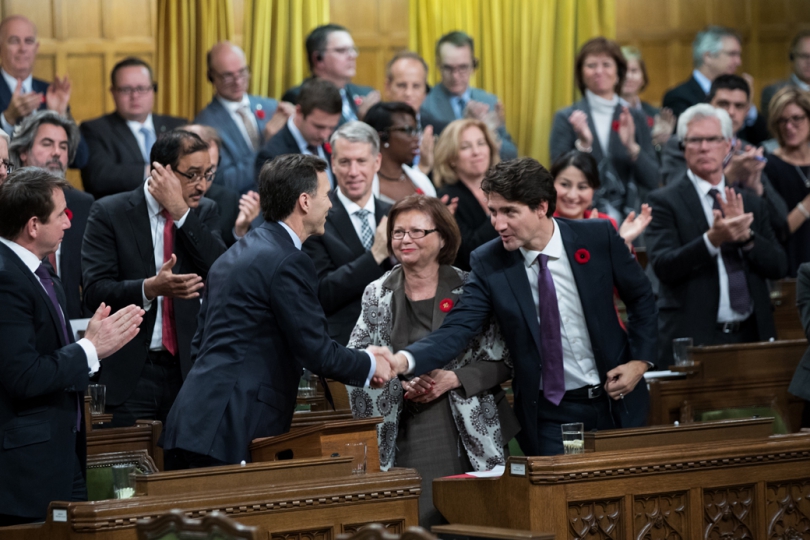If you find any new progressive measures nestled in Finance Minister Bill Morneau’s federal budget Wednesday, you can probably credit the fine folks at the Canadian Centre for Policy Alternatives for them.
That’s because the CCPA, a progressive, non-partisan think tank, has almost certainly already proposed those measures in one of its previous alternative federal budgets.
Founded in 1980 in Ottawa, the CCPA published its first alternative federal budget in 1995 in response to then-Liberal Finance Minister Paul Martin’s draconian plans to cut $25-billion from public services. In his budget speech that year, Martin promised to “redesign the very role and structure of government itself… It is the very re-definition of government itself that is the main achievement of this budget.”
“Our goal,” explains David Macdonald, the CCPA’s chief economist and the coordinator of its alternative federal budget project since 2008, “was to show that the government could get back to balance, if it wanted to, and that budgets represent choices about values, not just economics.”
That has continued to be CCPA’s mantra in the 22 years of annual alternative federal budgets since then.
“The Alternative Federal Budget,” as the CCPA’s website puts it, “is a ‘what if’ exercise — what a government could do if it were truly committed to an economic, social, and environmental agenda that reflects the values of the large majority of Canadians — as opposed to the interests of a privileged minority.”
“Budgets tend to be seen as esoteric or simply as financial documents, which is too bad since this is the most important document any government produces,” Macdonald explains. As a student, he chose to get his master’s degree in the philosophy of economics rather than in economics because he found conventional neo-classical economics with its ubiquitous supply-and-demand graphs “not flexible enough” to understand the world.
Canada certainly isn’t the only country in the world where groups like the CCPA produce public-interest-focused alternatives to official government budgets, but Macdonald says “most of them have nowhere near the depth or technical detail you’ll find in the CCPA’s. It’s quite sophisticated.”
The CCPA’s annual budget-making process — like the government’s itself — begins in early September, at least six months before budget day. A “crack team of economists” get together three or four times early on to engage in wide-ranging discussions about the current state of government finances and consider key priorities for the coming year.
During the fall, other researchers produce public papers on specific issues such as child care policy. Consulting with on-the-ground working groups — including environmentalists, student leaders, child care workers and volunteers — subject area experts then draft the budget’s 22 individual chapters. The working groups consider those individual drafts and suggest changes.
Once all that is done, Macdonald, as coordinator, helps estimate “how much things will cost and look at the broader impacts of what’s being proposed.”
Is it all worth it?
“Oh yeah,” replies Macdonald. “It definitely is.”
Over time, proposals that began in CCPA alternative budgets have often worked their way into actual budgets. The parliamentary budget officer appointment in 2006? The guaranteed income supplement top-up in 2011? Those measures — and plenty of others — first saw the light of day in previous alternative federal budgets. The Trudeau Liberals cherry-picked from previous alternative federal budgets to help them win the 2015 general election. They even incorporated several of those proposals in their first budget, including adding a new tax bracket for high income earners and cutting tax-free savings account limits in half.
The CCPA’s 2017 alternative budget, which focused on reducing income inequality and driving “inclusive growth,” would — if implemented — “lift a million Canadians out of poverty, double economic growth to 5.4 per cent and, at its peak, result in 460,000 new jobs, bringing Canada’s unemployment rate down to 6.4 per cent.”
Don’t expect Bill Morneau’s budget on Wednesday to produce close to those results, or introduce many of the specific proposals in this year’s alternative budget — at least not this year.
What progressive measures should Canadians expect to find in this week’s budget? “I think there is likely to be an extension of the $400 million for child care that began last year,” Macdonald suggests, referring to yet another earlier alternative budget proposal. “Unfortunately, it’s not a full-scale expansion of a truly affordable child care system.”
What won’t be there? “The most progressive piece that could be in the budget, but won’t be, is any big moves to close regressive tax loopholes like the stock option deduction or the partial inclusion of capital gains.”
For the record: David Macdonald is also currently the treasurer of rabble.ca
rabble.ca will have coverage of the budget on Wednesday and follow-up stories about its impact on Canadians.
Please chip in to keep stories like these coming.
Image: PMO/Adam Scotti




